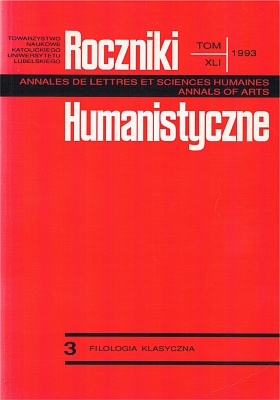Nieobecność Atossy w kommosie Persów Ajschylos
Abstrakt
The problem of the absence of Atossa in the final scene of The Persians has long been discussed. The author of the paper, however, puts forward yet a new approach. Instead of posing a traditional question, namely, why she is not there, he puts it in a different manner, i.e. could she after all meet her son on the stage or beyond it? He gives a negative answer to that. If Atossa had met Xerxes beyond the stage and there had given him a new garment, then in front of the spectator there would not have stood a man struck by disaster but a Persian king, such as Darius, who was the symbol of success and well-being. In that case the dramatic force of that kommos would have been totally destroyed. Atossa could not meet her son on the stage, either. The king could not have changed his torn garments in full view of the audience. It would also be difficult to imagine a situation in which he himself, in accordance with the text, would have lamented over his rags, while the maids would have been holding new garments. Anyway, one may take into account only these two possibilities. In none of them, however, would Atossa have achieved her purpose which was to protect her son from the shame of being seen by the subjects (the Chorus), since Xerxes would have entered the stage in rags.
If, however, Atossa in no case could meet her son, why does Aeschylus foretell such a possibility in the play? The queen expresses her willingness to go and meet her son in order to give him a new garment but her words should not be taken as a prediction of something which is indeed going to take place. They should rather be understood as an expression of the mother’s attitude. When Atossa got to know that her son was coming back in rags she, as a loving mother, could not do anything but to express her desire to give him new garments in order to save him from shame. The poet, however, could not permit such an encounter, and that encounter does not take place in the play. The spectator can only guess that some unpredictable obstacle has taken place. The researcher of Aeschylus, however, must be aware that in tragedy as a theatrical work such an encounter was impossible for the benefit of the work.
Copyright (c) 1993 Roczniki Humanistyczne

Utwór dostępny jest na licencji Creative Commons Uznanie autorstwa – Użycie niekomercyjne – Bez utworów zależnych 4.0 Międzynarodowe.





